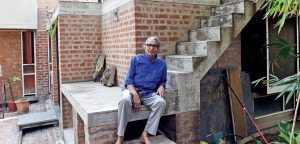Anthony Paletta in The Weekly Standard:
 First-time visitors to India are often struck by the abrupt contrasts in the built environment. A realm of older, urban-fabric chaos—one that works extremely well in the manner that pedestrian-oriented cities do anywhere—will suddenly give way to a realm of more recent dysfunctional sprawl. Traditional urban forms in India show an adaptive response to climate and to centuries of patterns of use. But the country’s newer, road-emphasizing development applies 20th-century models of Western planning—models that we in the West have ourselves come to lament. Such urban growth patterns have unintended, undesirable consequences even in places where nearly everyone can afford a car; they can be disastrous in places like India where many people cannot. And it’s not just the road patterns that are ill suited to the country’s needs. Disregard for local circumstances also characterizes much 20th-century Indian architecture—resulting in climate-controlled structures indistinguishable in style from buildings you might see in the United States, Scandinavia, China, or Africa.Realigning contemporary design and architecture to the needs of India has been a major theme in the life’s work of B.V. Doshi. He is the winner of this year’s Pritzker Prize, often described as the Nobel Prize of architecture. It is invariably awarded to architects of great talent, most of whom are very well known. The Pritzker family fortune that funds the award was derived in large part from the Hyatt hotel chain, and the honorees tend to be the sort of starchitects whose name recognition resembles that of the chain—and whose commissions are about as widespread as its locations. Most require a map of several continents, if not the full world, to encompass their work.
First-time visitors to India are often struck by the abrupt contrasts in the built environment. A realm of older, urban-fabric chaos—one that works extremely well in the manner that pedestrian-oriented cities do anywhere—will suddenly give way to a realm of more recent dysfunctional sprawl. Traditional urban forms in India show an adaptive response to climate and to centuries of patterns of use. But the country’s newer, road-emphasizing development applies 20th-century models of Western planning—models that we in the West have ourselves come to lament. Such urban growth patterns have unintended, undesirable consequences even in places where nearly everyone can afford a car; they can be disastrous in places like India where many people cannot. And it’s not just the road patterns that are ill suited to the country’s needs. Disregard for local circumstances also characterizes much 20th-century Indian architecture—resulting in climate-controlled structures indistinguishable in style from buildings you might see in the United States, Scandinavia, China, or Africa.Realigning contemporary design and architecture to the needs of India has been a major theme in the life’s work of B.V. Doshi. He is the winner of this year’s Pritzker Prize, often described as the Nobel Prize of architecture. It is invariably awarded to architects of great talent, most of whom are very well known. The Pritzker family fortune that funds the award was derived in large part from the Hyatt hotel chain, and the honorees tend to be the sort of starchitects whose name recognition resembles that of the chain—and whose commissions are about as widespread as its locations. Most require a map of several continents, if not the full world, to encompass their work.
By contrast, all of 91-year-old Doshi’s built works are in India. Sure, India is the seventh-largest country by geographic area and the second-most populous, but Doshi’s focus on his homeland is still radically narrow by the standards of today’s jet-set architects. When, directly after his Pritzker Prize acceptance lecture, he was asked in a Q&A whether he regretted “not having built in other countries,” his reply was a simple “No.”
More here.
